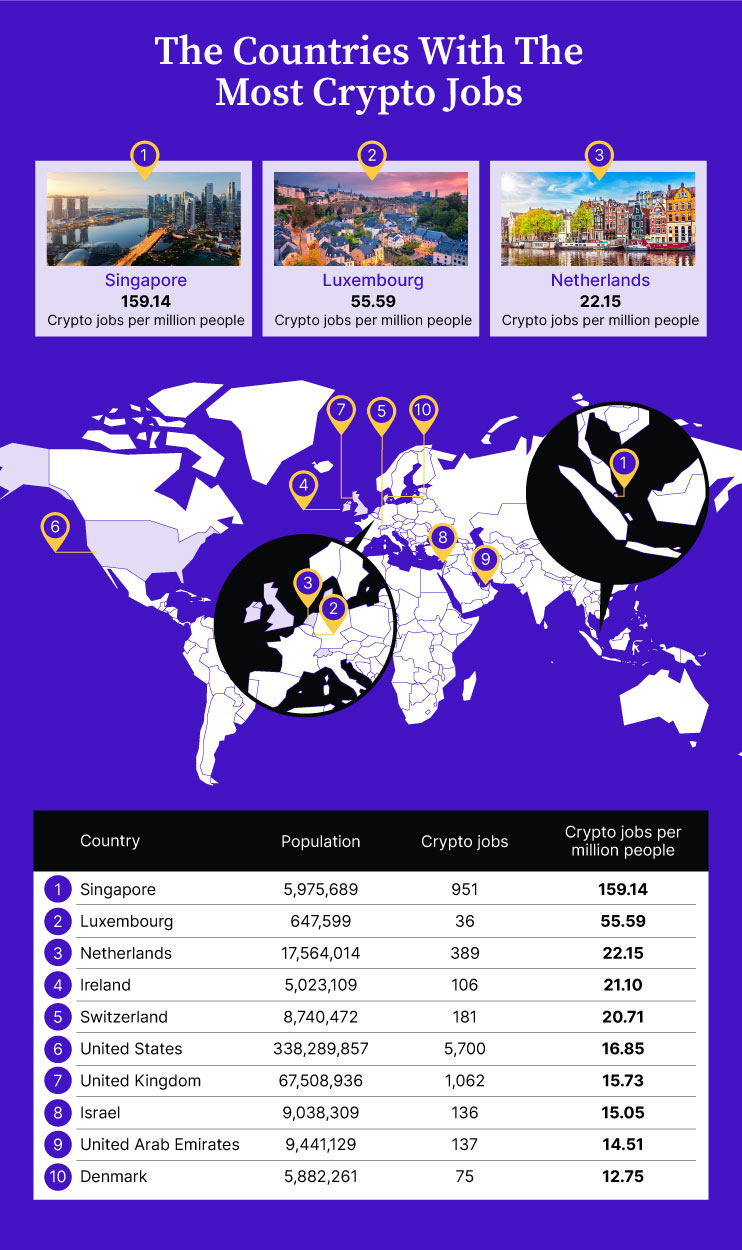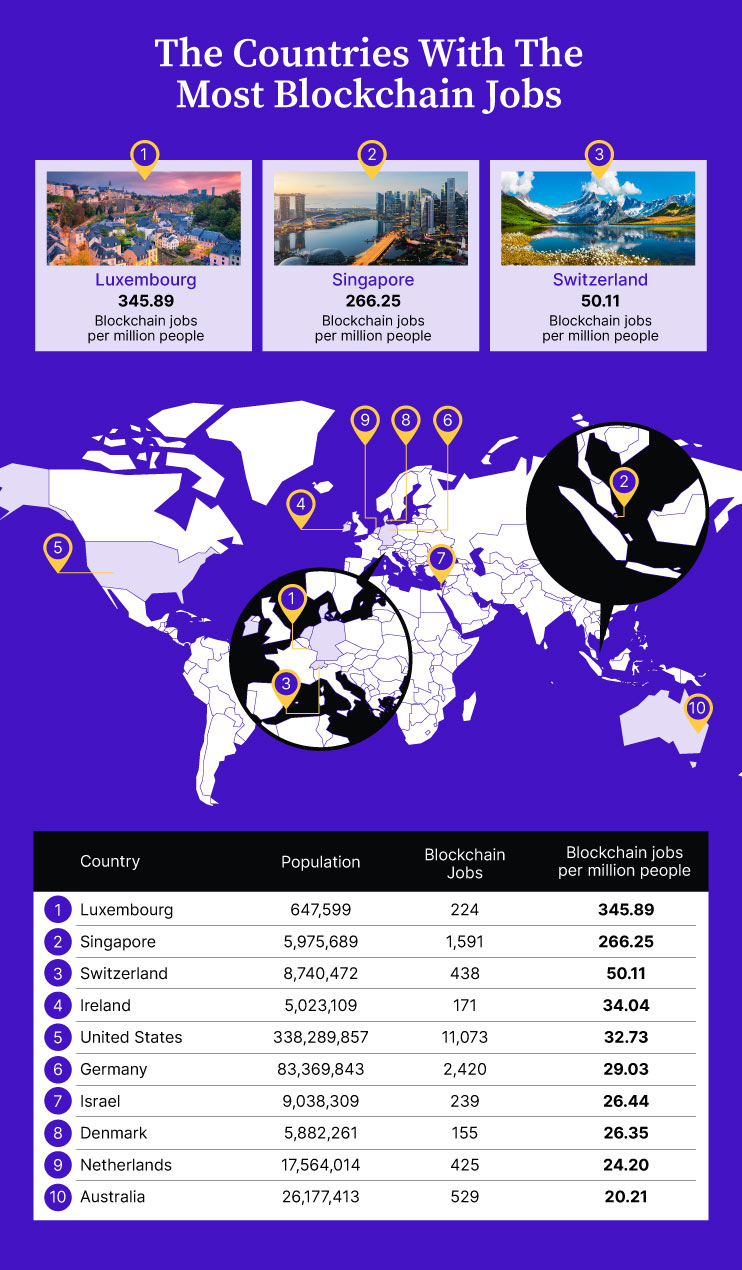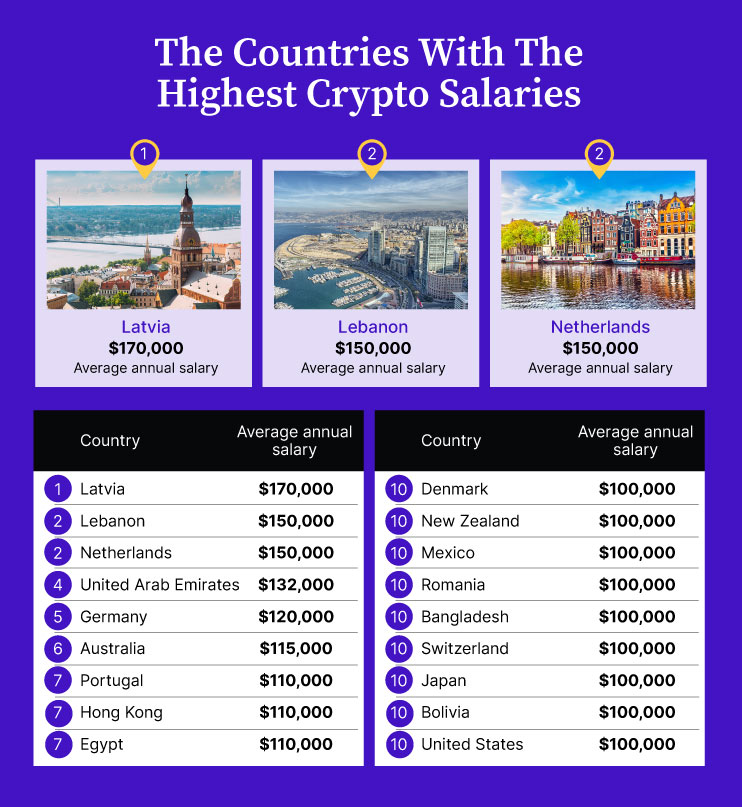
The world of cryptocurrencies has exploded in recent years, going from a niche interest that the majority of people and investors struggled to understand, to a global financial revolution the likes of which has never been seen before.
Cryptocurrencies can now be traded at any time and place with just a tap on your smartphone, as trading apps have sprung up to offer crypto investors a wide variety of choices when it comes to selecting the best crypto exchange for them.
With this huge increase in attention, understanding and acceptance, more people than ever before are getting into crypto. While trading cryptocurrencies offers the chance to get involved in this exciting new space in fintech, both for casual traders and professional investors, there is growing interest in actual employment opportunities within the crypto industry.
Between 2021 and 2022, there was a 601% increase in searches for “crypto jobs”, highlighting the growing interest that the sector is generating among job seekers. With this in mind, we’ve conducted a study of the crypto and blockchain jobs market to see where demand for new workers is highest, what salaries the industry can offer, and what universities were attended by the most successful figures in DeFi.
The countries with the most crypto jobs

Cryptocurrencies are an exciting new form of digital currency that many believe will be the future of global finance. As crypto becomes more popular around the world, being adopted by an increasing number of people, businesses and even some governments, the industry as a whole has continued to expand and create jobs all around the world.
By looking at the number of job postings for positions that mention “crypto” in the job description, we can see which countries offer the most opportunities to get involved in this exciting new financial space.
| Rank | Country | Population | Crypto Jobs | Crypto Jobs per Million People |
| 1 | Singapore | 5,975,689 | 951 | 159.14 |
| 2 | Luxembourg | 647,599 | 36 | 55.59 |
| 3 | Netherlands | 17,564,014 | 389 | 22.15 |
| 4 | Ireland | 5,023,109 | 106 | 21.10 |
| 5 | Switzerland | 8,740,472 | 181 | 20.71 |
| 6 | United States | 338,289,857 | 5,700 | 16.85 |
| 7 | United Kingdom | 67,508,936 | 1,062 | 15.73 |
| 8 | Israel | 9,038,309 | 136 | 15.05 |
| 9 | United Arab Emirates | 9,441,129 | 137 | 14.51 |
| 10 | Denmark | 5,882,261 | 75 | 12.75 |
| 11 | Australia | 26,177,413 | 298 | 11.38 |
| 12 | Canada | 38,454,327 | 344 | 8.95 |
| 13 | Portugal | 10,270,865 | 87 | 8.47 |
| 14 | France | 64,626,628 | 437 | 6.76 |
| 15 | New Zealand | 5,185,288 | 29 | 5.59 |
| 16 | Germany | 83,369,843 | 450 | 5.40 |
| 17 | Romania | 19,659,267 | 105 | 5.34 |
| 18 | Belgium | 11,655,930 | 62 | 5.32 |
| 19 | Spain | 47,558,630 | 225 | 4.73 |
| 20 | Norway | 5,434,319 | 25 | 4.60 |
1. Singapore Crypto jobs per million people: 159.14
Singapore is the country with the highest number of crypto job listings compared to its population size, with 159.14 crypto jobs per million people. This is by far the highest relative number of crypto job listings, being almost three times as many as any other country.
Singapore is well-known for being a forward-looking country that is highly adaptive and technologically advanced, while also having a long history as a regional hub of trade and commerce. Therefore, it comes as no surprise that the cryptocurrency industry is booming in this Asian city-state.
2. Luxembourg Crypto jobs per million people: 55.59
Luxembourg has the second highest rate of crypto job listings compared to its population, with 55.59 per million people. According to the OEC, Luxembourg’s biggest export is financial services, the value of which stood at $86.7 billion in 2018. Being such a busy financial centre and influential country in the European Union, Luxembourg is a great place for European crypto startups to call home.
3. Netherlands Crypto jobs per million people: 22.15
The Netherlands has the third highest rate of crypto job listings in our study, with 22.15 jobs available per million people. The capital, Amsterdam, is a vibrant European city with a reputation for doing things its own way, as well as being the birthplace of the stock market, making it a natural fit for the new frontier of the crypto economy.
The countries with the most blockchain jobs

Blockchain technology is the backbone of the crypto economy, providing the tech on which cryptocurrencies and distributed ledgers are built. While blockchain technology has many applications outside of decentralised finance, the two are intrinsically linked, and the proliferation of blockchain tech only makes it easier to incorporate cryptocurrencies into the global economy.
In this section, we have searched specifically for job listings that mention “blockchain” in their descriptions to identify the countries where jobs relating to this expansive new technology are most common.
| Rank | Country | Population | Blockchain Jobs | Blockchain Jobs per Million People |
| 1 | Luxembourg | 647,599 | 224 | 345.89 |
| 2 | Singapore | 5,975,689 | 1,591 | 266.25 |
| 3 | Switzerland | 8,740,472 | 438 | 50.11 |
| 4 | Ireland | 5,023,109 | 171 | 34.04 |
| 5 | United States | 338,289,857 | 11,073 | 32.73 |
| 6 | Germany | 83,369,843 | 2,420 | 29.03 |
| 7 | Israel | 9,038,309 | 239 | 26.44 |
| 8 | Denmark | 5,882,261 | 155 | 26.35 |
| 9 | Netherlands | 17,564,014 | 425 | 24.20 |
| 10 | Australia | 26,177,413 | 529 | 20.21 |
| 11 | United Kingdom | 67,508,936 | 1,335 | 19.78 |
| 12 | France | 64,626,628 | 1,188 | 18.38 |
| 13 | Belgium | 11,655,930 | 193 | 16.56 |
| 14 | United Arab Emirates | 9,441,129 | 148 | 15.68 |
| 15 | Portugal | 10,270,865 | 143 | 13.92 |
| 16 | Canada | 38,454,327 | 514 | 13.37 |
| 17 | Poland | 39,857,145 | 506 | 12.70 |
| 18 | Austria | 8,939,617 | 109 | 12.19 |
| 19 | Spain | 47,558,630 | 535 | 11.25 |
| 20 | Romania | 19,659,267 | 212 | 10.78 |
1. Luxembourg Blockchain jobs per million people: 345.89
Luxembourg is the country with the most advertised blockchain-related jobs compared to its population, with 345.89 listings per million people. Having placed second for crypto jobs, it is clear that this small European country is becoming a centre of Web3 industries and activity.
2. Singapore Blockchain jobs per million people: 266.25
In second place, with 266.25 blockchain jobs per million people, is Singapore. Having also had the most crypto job listings of any country, Singapore is much like Luxembourg in that it is a small country with a rate of Web3 employment and activity that is by far the highest in its respective region.
3. Switzerland Blockchain jobs per million people: 50.11
Switzerland is the country with the third highest rate of blockchain job listings, with 50.11 per million people. Switzerland is a country that is often thought of as synonymous with banking and high-income individuals, so the high number of job listings for the technology that supports the biggest-ever disruption to global finance seems only natural.
Crypto salaries around the world
While the majority of those interested in making money from cryptocurrencies will look to invest directly via crypto exchanges, those with the necessary skills, experience and enthusiasm may consider working full-time in the burgeoning crypto economy.
In this section we will investigate how earnings in crypto-related jobs vary between locations, highlighting the best countries in the world for a high salary in the crypto industry.
The continental divide of crypto earnings

| Rank | Location | Average Annual Salary |
| 1 | North America | $120,000 |
| 2 | Remote | $110,000 |
| 3 | Europe | $80,000 |
| 4 | Oceania | $70,000 |
| 5 | Asia | $50,000 |
| 6 | Africa | $47,000 |
| 7 | South America | $42,000 |
In this short inter-continental summary, we can see that North America offers workers the best average salary when working in crypto, with approximate annual earnings of $120,000. Remote roles then offer the second-highest remuneration of $110,000, with crypto workers in Europe earning the third-highest amount at $80,000 per year.
At the bottom end of the scale is South America, where average earnings in crypto roles are lowest at $42,000 per year, while African crypto workers earn slightly more at $47,000 per annum.
The countries with the highest crypto salaries

| Rank | Country | Average Yearly Salary |
| 1 | Latvia | $170,000 |
| 2 | Lebanon | $150,000 |
| 2 | Netherlands | $150,000 |
| 4 | United Arab Emirates | $132,000 |
| 5 | Germany | $120,000 |
| 6 | Australia | $115,000 |
| 7 | Portugal | $110,000 |
| 7 | Hong Kong | $110,000 |
| 7 | Egypt | $110,000 |
| 10 | Denmark | $100,000 |
| 11 | New Zealand | $100,000 |
| 12 | Mexico | $100,000 |
| 13 | Romania | $100,000 |
| 14 | Bangladesh | $100,000 |
| 15 | Switzerland | $100,000 |
| 16 | Japan | $100,000 |
| 17 | Bolivia | $100,000 |
| 18 | United States | $100,000 |
1. Latvia Average Yearly Salary: $170,000
Latvia has the highest average crypto salary of $170,000, making it the most lucrative place to work in the crypto industry. The economy of this Baltic country is largely based on service industries, with the biggest three being transportation, information technology and financial services. The latter two of these sectors are particularly relevant for the blockchain and cryptocurrency sectors, making it prime territory for the development of cryptocurrency businesses.
2. Lebanon & the Netherlands Average Yearly Salary: $150,000
Lebanon and the Netherlands both tied for second place with an average annual salary in the crypto sector of $150,000. Finance is incredibly important to the Lebanese economy, with as much as 70% of the gross national product being attributed to services and banking sectors.
The Netherlands is also a well-established financial powerhouse, home to many global corporations as well as the bustling melting pot of Amsterdam, which has been shown to be a hive of activity within the crypto sphere.
The crypto and web3 jobs with the highest salaries

While working in the crypto industry offers fantastic opportunities for career growth and excellent salaries, not all roles are equally compensated. In this section, we will reveal the highest-earning crypto positions, as well as take a look at some of the more varied roles you can find within the sector.
| Rank | Job Title | Average Yearly Salary |
| 1 | Lead Developer | $120,000 |
| 1 | Senior Developer | $120,000 |
| 1 | Smart Contract Developer | $120,000 |
| 4 | Architecture Developer | $117,000 |
| 5 | Machine Learning Engineer | $113,000 |
| 6 | Product Manager | $112,000 |
| 7 | Rust Developer | $110,000 |
| 8 | Mobile Developer | $103,000 |
| 9 | Backend Developer | $100,000 |
| 10 | Full Stack Developer | $100,000 |
| 11 | Golang Developer | $100,000 |
| 12 | Node Developer | $100,000 |
| 13 | Project Manager | $100,000 |
| 14 | React Developer | $100,000 |
| 15 | Solidity Developer | $100,000 |
| 16 | Javascript Developer | $98,000 |
| 17 | Blockchain Developer | $94,000 |
| 18 | Front End Developer | $90,000 |
| 19 | Finance roles | $82,000 |
| 20 | Design roles | $80,000 |
| 21 | Java Developer | $80,000 |
| 22 | Sales roles | $75,000 |
| 23 | Marketing roles | $72,000 |
| 24 | QA Engineer | $71,000 |
| 25 | Community Manager | $70,000 |
| 26 | Junior Developer | $60,000 |
| 27 | Social Media roles | $50,000 |
1. Lead Developer, Senior Developer and Smart Contract Developer
Average Yearly Salary: $120,000
Three jobs were tied for having the highest average salary in the crypto and Web3 sectors, with those being Lead Developer, Senior Developer and Smart Contract Developer, all of which have an annual pay packet of $120,000.
Two of these roles, senior and lead developers, indicate having higher responsibilities than average employees in similar roles, thereby justifying the higher salary. The role of Smart Contract Developer is highly specialised so the required skills may be in short supply, meaning the role can command a higher salary.
Non-Developer roles
The majority of roles listed in this section are developer positions that are highly technical, which is indicative of the industry as a whole. However, there are some job roles present in every company which do not require specialist knowledge, though knowing the ins and outs of your chosen industry is always advantageous.
Salaries in blockchain and crypto companies remain relatively high for many non-developer roles. For example, positions in finance offer an average salary of $82,000, while jobs in design offer $80,000 and sales roles offer $75,000 per year. The lowest-earning positions are social media roles which come with an average annual salary of $50,000.
The courses studied by the world’s top crypto billionaires

In this section, we have taken a closer look at the universities attended by some of the world’s wealthiest and most successful crypto businesspeople. All of these billionaires made their fortunes in the crypto industry, so the courses they studied could help future crypto-prodigies on the path to success.
1. Changpeng Zhao – Estimated worth: $17.4 billion
Alma Mater: McGill University
Studied: Computer Science
The wealthiest individual that we looked at is Changpeng Zhao, the co-founder and CEO of Binance, the world’s largest crypto exchange by trading volume. Zhao studied Computer Science at McGill University in Montreal, Canada, before being selected for an internship at a subcontractor of the Tokyo Stock Exchange, where he began his financial career developing software for matching trade orders. Following a long career in which he started several fintech companies, Zhao is now estimated to be worth an incredible $17.4 billion.
2. Sam Bankman-Fried – Estimated worth: $16.7 billion
Alma Mater: Massachusetts Institute of Technology (M.I.T.)
Studied: Physics and Mathematics
As of early November, Sam Bankman-Fried was the second most wealthy crypto CEO with an estimated net worth of $16.7 billion. Having studied Physics and Mathematics at the Massachusetts Institute of Technology (M.I.T), his first professional role was at trading firm Jane Street Capital where he began as an intern, progressing to a full-time employee upon graduation. Bankman-Fried founded his first company, Alameda Research, in 2017 and still retains a 90% stake, but he is perhaps most well-known as co-founder and CEO of FTX, one of the world’s largest crypto exchanges.
Unfortunately, Bankman-Fried’s fortunes have taken a severe downturn lately as FTX collapsed amid claims of “mishandled corporate funds” that revealed sister company Alameda Research had been using FTX clients’ funds to make risky trades and was subsequently bailed out by FTX using clients’ money to do so. This means that while Bankman-Fried was the second wealthiest crypto billionaire at the beginning of the month, his fortune will have mostly evaporated by December.
3. Gary Wang Estimated worth: $4.6 billion
Alma Mater: Massachusetts Institute of Technology (M.I.T.)
Studied: Mathematics and Computer Science
Gary Wang is the third wealthiest crypto entrepreneur with an estimated fortune of $4.6 billion. As co-founder of FTX alongside Sam Bankman-Fried, Wang serves as the cryptocurrency exchange’s CTO and owns approximately 16% of the company. Like his partner in founding FTX, Wang also attended M.I.T. where he studied Mathematics and Computer Science, graduating in 2015. Wang was then employed as a software engineer at Google for several years before founding FTX in 2019.
Like Sam Bankman-Fried, the majority of Wang’s wealth stemmed from the success of the FTX trading platform. So, with the sudden collapse of FTX, Gary Wang’s estimated fortune is expected to have plummeted by the end of the month.
| Name | Net Worth | Source of Wealth | Subject of Study |
| Changpeng Zhao | $65 billion | Binance | Computer Science |
| Sam Bankman-Fried | $24 billion | FTX |
Physics and Mathematics
|
| Brian Armstrong | $6.6 billion | Coinbase |
Economics and Computer Science
|
| Gary Wang | $5.9 billion | FTX |
Mathematics and Computer Science
|
| Chris Larsen | $4.3 billion | Ripple |
International Business and Accounting
Master of Business Administration (MBA) |
| Cameron Winklevoss | $4 billion | Bitcoin |
Economics
Master of Business Administration (MBA) |
| Tyler Winklevoss | $4 billion | Bitcoin |
Economics
Master of Business Administration (MBA) |
| Song Chi-hyung | $3.7 billion | Upbit |
Computer Science and Economics
|
| Jed McCaleb | $2.5 billion | Ripple, Stellar | N/A (dropped out) |
| Joseph Lau | $2.4 billion | Alchemy | N/A (unknown) |
| Nikil Viswanathan | $2.4 billion | Alchemy | Computer Science |
| Alex Atallah | $2.2 billion | OpenSea |
Computer Science
Cyber Security (Overseas Study Programme) |
| Devin Finzer | $2.2 billion | OpenSea |
Computer Science and Mathematics
|
| Fred Ehrsam | $2.1 billion | Coinbase |
Computer Science and Economics
|
| Kim Hyoung-nyon | $1.9 billion | Upbit |
Agricultural Economics
|
| Michael Saylor | $1.6 billion | MicroStrategy |
Aeronautics and Astronautics; Science, Technology, and Society
|
| Matthew Roszak | $1.4 billion | Bitcoin, other cryptocurrencies | Economics |
| Tim Draper | $1.2 billion | Bitcoin, other cryptocurrencies |
Electrical Engineering
Master of Business Administration (MBA) |
Blockchain business leaders: the most popular universities

To shed more light on the best educational institutions for a successful career in blockchain, we’ve carried out a study of more than 150 CEOs, founders and chairmen of blockchain and cryptocurrency companies to see which universities have produced the most business leaders in the sector.
| Rank | University | Blockchain Business Leaders |
| 1 | University of California | 13 |
| 2 | Harvard University | 11 |
| 3 | Stanford University | 8 |
| 4 | Massachusetts Institute of Technology | 7 |
| 5 | University of Michigan | 6 |
| 5 | University of Oxford | 6 |
| 7 | Cornell University | 3 |
| 7 | Duke University | 3 |
| 7 | New York University | 3 |
| 7 | San Francisco State University | 3 |
| 7 | University of Cambridge | 3 |
1. University of California Blockchain business leaders: 13
The University of California has produced the most blockchain business leaders with as many as 13 being counted among their alumni. The University of California is one of the world’s leading public research universities and is comprised of ten separate campuses spread across the state of California. The highest rated of these campuses is Berkeley, which placed 32nd in the QS World University Rankings 2022 with an overall score of 82.5.
Berkeley is also the campus that produced the most blockchain business leaders with nine among their alumni, two of which came from the Haas School of Business. The Los Angeles campus is responsible for two blockchain business leaders, while San Diego and Santa Barbara have one apiece.
| University of California Breakdown | Blockchain Business Leaders |
| University of California, Berkeley | 7 |
| University of California, Berkeley, Haas School of Business | 2 |
| University of California, Los Angeles | 2 |
| University of California, San Diego | 1 |
| University of California, Santa Barbara | 1 |
2. Harvard University Blockchain business leaders: 11
Harvard University has produced the second-highest number of blockchain business leaders, with 11 among its alumni. Six of these came from Harvard Business School, while five came from the wider university.
Harvard University is one of the most prestigious in the United States and has seen many famous graduates including five U.S. presidents. The university currently sits fifth in the QS World University Rankings 2022 with an overall score of 98.
| Harvard Breakdown | Blockchain Business Leaders |
| Harvard Business School | 6 |
| Harvard University | 5 |
3. Stanford University Blockchain business leaders: 8
Stanford University has produced the third highest number of blockchain business leaders with 8 counted among their alumni. Two of these came from the Stanford Graduate School of Business while the other six studied at the wider university.
Stanford University is incredibly highly rated, ranking joint third with Cambridge on the QS World University Rankings 2022 with a score of 98.7.
| Stanford Breakdown | Blockchain Business Leaders |
| Stanford University | 6 |
| Stanford Graduate School of Business | 2 |
Blockchain business leaders: the most popular areas of study

We also took note of the subject that each business leader studied while at university, allowing us to compile a list of the most commonly studied courses among successful figures in the blockchain industry.
| Rank | Subject Studied | Count | Proportion of all Subjects Studied |
| 1 | Computer Science | 54 | 24.55% |
| 2 | Business and MBAs | 42 | 19.09% |
| 3 | Economics | 27 | 12.27% |
| 4 | Electrical Engineering | 13 | 5.91% |
| 5 | Finance | 9 | 4.09% |
| 6 | Social Sciences | 8 | 3.64% |
| 7 | Accounting | 7 | 3.18% |
| 8 | Mathematics | 7 | 3.18% |
| 9 | Engineering | 6 | 2.73% |
| 10 | Management | 6 | 2.73% |
| 11 | Philosophy | 6 | 2.73% |
1. Computer Science – Proportion of subjects studied: 24.55%
Computer science is the most popular course among blockchain business leaders, accounting for 24.55% of all subjects studied. Many billionaires who made their fortune in the crypto industry studied computer science, including Binance founder and CEO Changpeng Zhao, Alchemy co-founders Joe Lau and Nikil Viswanathan, as well as co-founder of FTX Gary Wang, who studied computer science alongside mathematics.
2. Business and MBA courses – Proportion of subjects studied: 19.09%
In third place, with 19.09% of courses studied by blockchain business leaders, are business and MBA courses. Business degrees can cover many different topics within the world of business, from starting a company to ensuring it runs efficiently. MBAs are more specialist postgraduate courses that focus on various aspects of management, business, and entrepreneurship.
Ripple Labs co-founder Chris Larsen and Binance US CEO Brian Schroder are two examples of high-profile blockchain business leaders who studied for an MBA, while blockchain.com co-founder Nicolas Cary studied for an undergraduate degree in business before beginning his career.
3. Economics – Proportion of subjects studied: 12.27%
Economics is the third most commonly studied subject, accounting for 12.27% of all courses taken by blockchain business leaders. Notable figures in blockchain who studied economics include Ripple Labs CEO Brad Garlinghouse, CEO and co-founder of blockchain.com Peter Smith, as well as Matthew Roszak, the chairman and co-founder of Bloq, Inc.
Methodology
We wanted to create a global crypto career report that would address multiple factors such as job demand, salaries, and education.
To do this, we first looked at the number of job listings for crypto and blockchain-related roles in 50 different countries using data from Indeed. We then calculated the number of jobs per million people in each country using population data from World Population Review in order to compare the relative level of demand in different countries.
We then collected data on average salaries in the crypto and Web3 space from Web3 Jobs, comparing earnings in different roles, countries and continents.
The next section looked specifically at the educational backgrounds of some of the world’s wealthiest crypto businesspeople, ranked by wealth according to data from Forbes and correct as of November 2022. Here we revealed the universities that each billionaire attended as well as the subject they studied.
Lastly, we looked at the universities attended by over 150 CEOs, chairmen and founders of blockchain companies to reveal the educational institutions that produce the most blockchain business leaders, as well as the courses they commonly study.